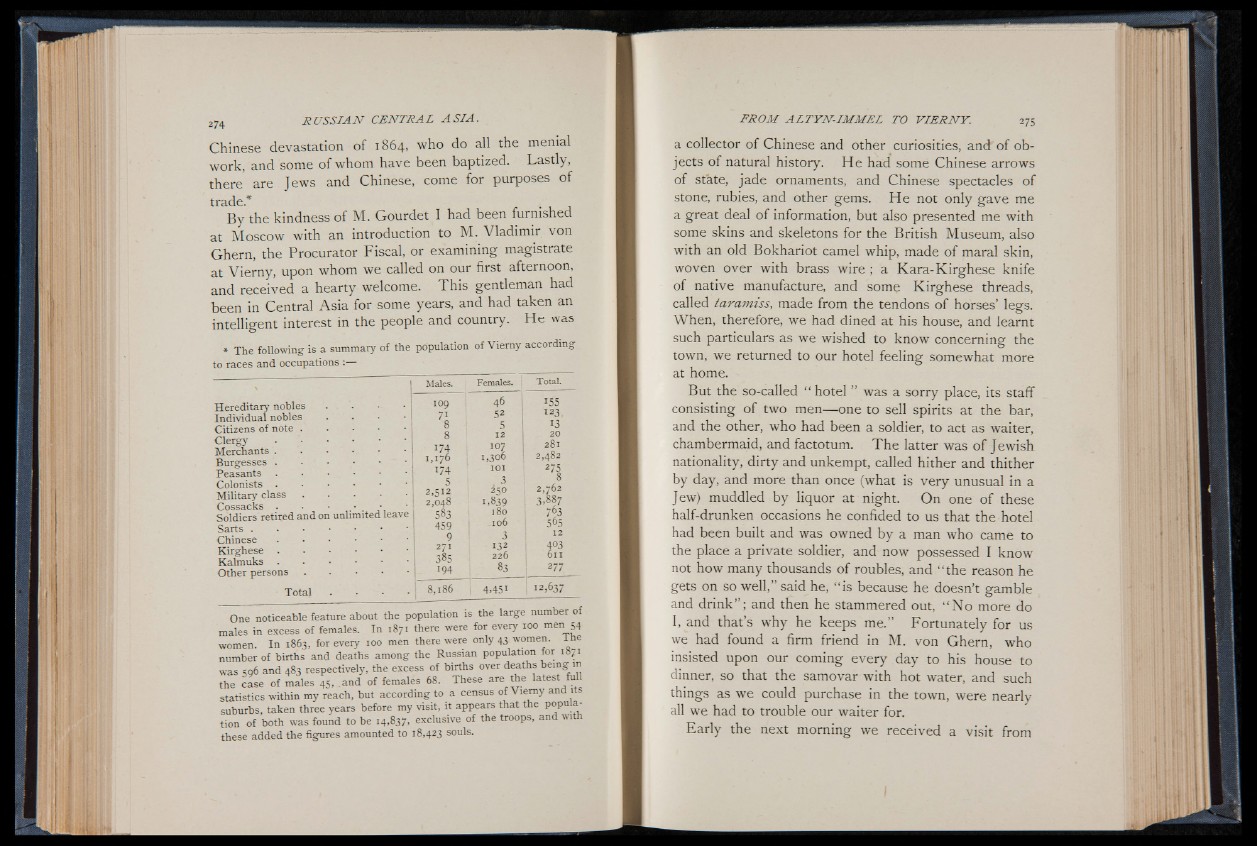
Chinese devastation of 1864, who do all the menial
work, and some of whom have been baptized. Lastly,
there are Jews and Chinese, come for purposes of
trade*
By the kindness of M. Gourdet I had been furnished
at Moscow with an introduction to M. Vladimir von
Ghern, the Procurator Fiscal, or examining magistrate
at Vierny, upon whom we called on our first afternoon,
and received a hearty welcome. This gentleman had
been in Central Asia for some years, and had taken an
intelligent interest in the people and country. He was
* The following is a summary of the population of Vierny according
to races and occupations :—
Hereditary nobles
Individual nobles
Citizens of note .
Clergy
Merchants
Burgesses
Peasants
Colonists
Military class
Cossacks • •
Soldiers retired and on unlimited leav
Sarts .
Chinese
Kirghese .
Kalmuks .
Other persons .
Total
I Males.
rc>9
71
m
1,176
1745
2,512
2,048
583
459
9
27t
385
194
8,186
Females.
46
525
12
IOI
3 ¿so
1,839
180
106
132
226
4.451
Total.
155
t23,
13
20
28r
2,482
275
8
2,762
3.887
763
565
12
403
611
277
12,637
One noticeable feature about the population is the large number of
males in excess of females. In 1871 there were for every 100 men 54
women. In 1863, for every 100 men there were only 43 women. T e
number of births and deaths among the Russian population for 1 71
was 596 and 483 respectively, the excess of births over deaths bemgin
the case of males 45, .and of females 68. These a r e th e latest fu
statistics within my reach, but according to a census of Vierny and it
suburbs, taken three years before my visit, it appears that the population
of both was found to be 14,837, exclusive of the troops, and with
these added the figures amounted to 18,423 souls.
a collector of Chinese and other curiosities, and of objects
of natural history. He had some Chinese arrows
of state, jade ornaments, and Chinese spectacles of
stone, rubies, and other gems. He not only gave me
a great deal of information, but also presented me with
some skins and skeletons for the British Museum, also
with an old Bokhariot camel whip, made of maral skin,
woven over with brass wire ; a Kara-Kirghese knife
of native manufacture, and some Kirghese threads,
called taramiss, made from the tendons of horses’ legs.
When, therefore, we had dined at his house, and learnt
such particulars as we wished to know concerning the
town, we returned to our hotel feeling somewhat more
at home.
But the so-called “ hotel ” was a sorry place, its staff
consisting of two men— one to sell spirits at the bar,
and the other, who had been a soldier, to act as waiter,
chambermaid, and factotum. The latter was o f Jewish
nationality, dirty and unkempt, called hither and thither
by day, and more than once (what is very unusual in a
Jew) muddled by liquor at night. On one of these
half-drunken occasions he confided to us that the hotel
had been built and was owned by a man who came to
the place a private soldier, and now possessed I know
not how many thousands of roubles, and “ the reason he
gets on so well,” said he, “ is because he doesn’t gamble
and drink” ; and then he stammered out, “ No more do
I, and that’s why he keeps me.” Fortunately for us
we had found a firm friend in M. von Ghern, who
insisted upon our coming every day to his house to
dinner, so that the samovar with hot water, and such
things as we could purchase in the town, were nearly
all we had to trouble our waiter for.
Early the next morning we received a visit from